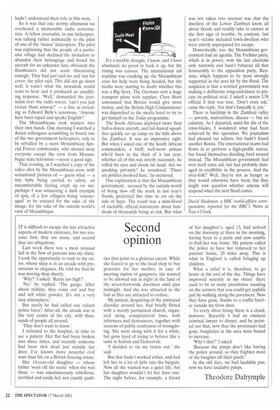Second opinion
IT is difficult to escape the less attractive aspects of modern existence, for two reasons: first, they are many, and second they are ubiquitous.
Last week there was a most unusual lull in the flow of patients into my clinic. I took the opportunity to rush to my tailor, whose shop is in an arcade with pretensions to elegance. He told me that he was moving shop shortly.
'Why?' I asked. 'Rents too high?'
'No,' he replied. 'The gangs. After about midday, they come out and buy and sell white powder. It's not a very nice atmosphere.'
But surely he had called our valiant police force? After all, the arcade was in the very centre of the city, with thousands of people all around.
'They don't want to know.'
I returned to the hospital, in time to see a patient. Her flat had been broken into three times, and recently someone had been shot dead just outside her door. I've known more peaceful civil wars than life on a British housing estate.
Her 14-year-old daughter — whose father 'went off the scene' when she was three — was simultaneously rebellious, terrified and easily led, not exactly quali ties that point to a glorious career. While she feared to go to the local shop to buy groceries for her mother, in case of meeting rapists or gangsters, she wanted to be allowed out at night in the land of the seven-foot-wide doormen until past midnight. And she was attracted to the bad as flies are attracted to ordure.
My patient, despairing of the antisocial disorder around her, had briefly flirted with a sternly puritanical church, organised along conspiratorial lines, with informers and denouncers, together with sessions of public confession of wrongdoing. She went along with it for a while, but grew tired of trying to behave like a saint in Sodom and Gomorrah.
'I decided to sin my brains out,' she said.
But that hadn't worked either, and had left her in a lot of debt into the bargain. Now all she wanted was a quiet life, but her daughter wouldn't let her have one. The night before, for example, a friend of her daughter's, aged 13, had arrived on the doorstep at three in the morning, having been to a party and now unable to find her way home. My patient called the police to have her removed to her parents' home, 20 miles away. This is what in England is called bringing up children.
What a relief it is, therefore, to go home at the end of the day. Things have improved recently in my street: there used to be so many prostitutes standing on the corners that you could get syphilis just by walking along the pavement. Now they have gone, thanks to a traffic barrier outside my front door.
To every silver lining there is a cloud, however. Recently I had an eminent criminal lawyer to dinner, and he pointed out that, now that the prostitutes had gone, burglaries in the area were bound to increase.
'Why's that?' I asked.
'Because the pimps don't like having the police around, so they frighten most of the burglars off their patch.'
In the old days, we had laudable pus; now we have laudable pimps.
Theodore Dalrymple


































































 Previous page
Previous page